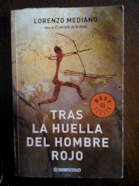
Lorenzo Mediano
Tras la huella del hombre rojo
(¬ On the Track of the Red Man)
DeBols!llo, 2007 [tale, Spa, I3]
–––––––––––––––––––––––
... between the two species is overstressed, constantly pointing out that Neandertals are direct, pragmatic, simple-minded people who take things just the way they are without ever looking for any hidden meaning, while Cro-Magnons live into a complex and very ceremonially laden world, where even the smallest fact can only happen if some god is properly praised or obeyed.
About five hundred pages of the book flow along these mostly predictable lines and support the feeling of just an historic divertissement, with no underlying moral message.
And then the Neandertal protagonist - who, up to that moment, had only been laughing at Cro-Magnons’ silly beliefs and superstitions - is flashed by the sudden realization that the Cro-Magnons aren’t really ruled by their gods but they rather get an irresistible force from them, as they always put into their gods’ mouths those exact words that they want to be told. And since those words have been turned into the gods’ orders, those orders can’t be resisted, and the Cro-Magnons are therefore made inexorable as well.
This is the frightening message brought by this story, and the concern that should always be feared, whenever conscience is overwhelmed by any so-called ‘god’s will’.
–––––––––––––––––––––––




